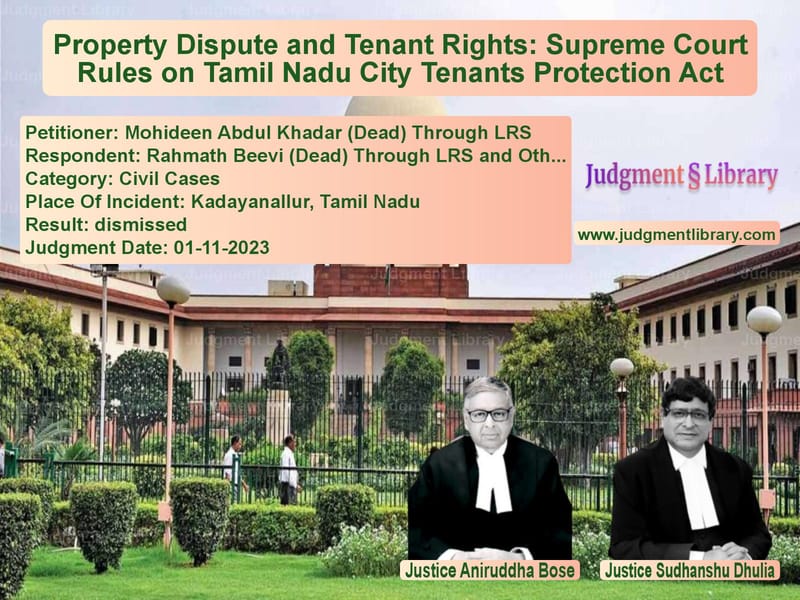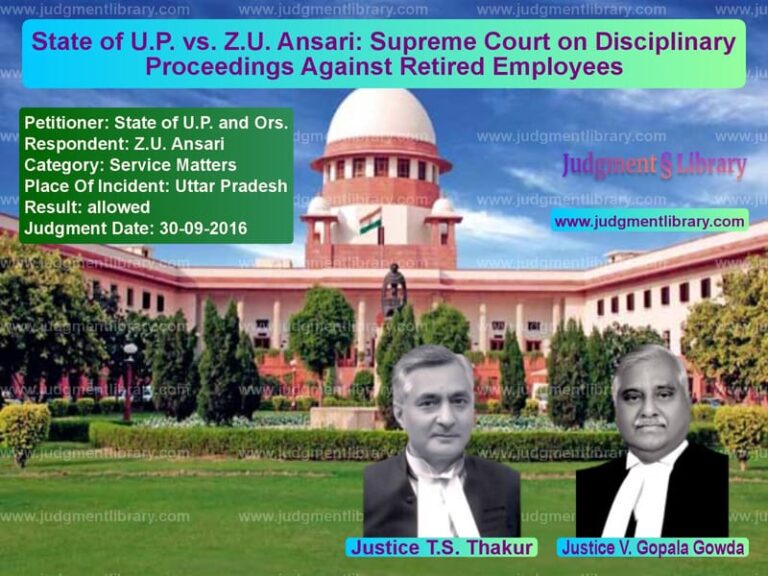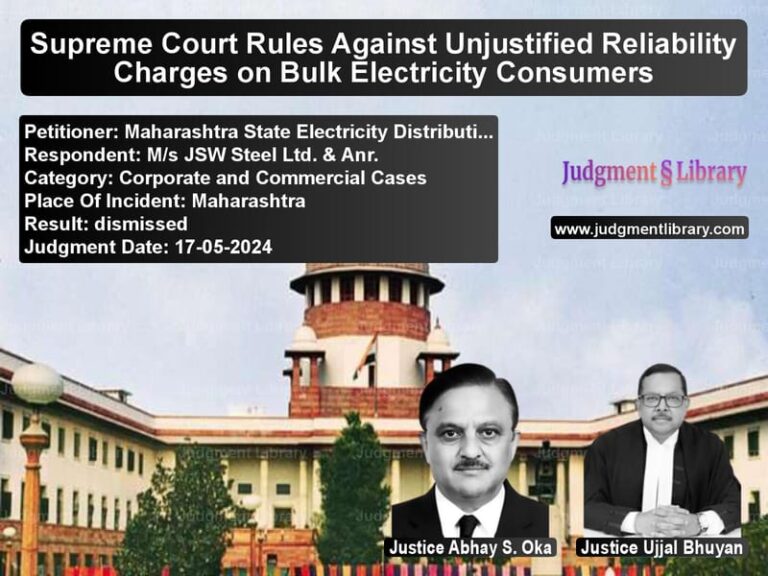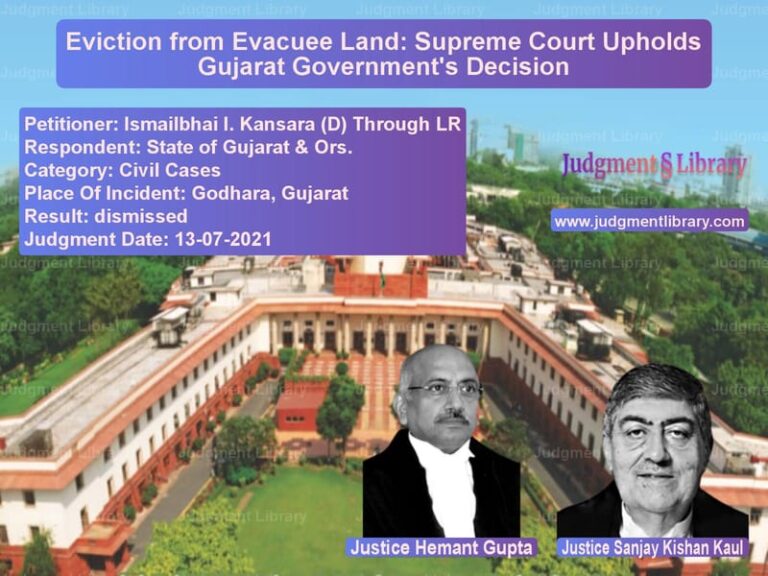Property Dispute and Tenant Rights: Supreme Court Rules on Tamil Nadu City Tenants Protection Act
The case of Mohideen Abdul Khadar (Dead) Through LRS vs. Rahmath Beevi (Dead) Through LRS and Others is a significant legal battle concerning property ownership, tenancy rights, and the applicability of the Tamil Nadu City Tenants Protection Act, 1921. The dispute involved the rightful possession and ownership of two adjacent blocks of land in Kadayanallur, Tamil Nadu. The Supreme Court’s ruling in this case clarifies key legal principles on property disputes, tenant rights, and the necessity of valid notices under Section 106 of the Transfer of Property Act, 1882.
Background of the Case
The dispute originated from the ownership and tenancy rights of two properties:
- The first scheduled property (15×15 sq. feet), which was allegedly sold to the deceased petitioner, Mohideen Abdul Khadar, by the original owner, Ameenal Beevi, through a sale deed dated 16.08.1989.
- The second scheduled property (15×18 sq. feet), which Mohideen claimed as a tenanted property under Ameenal Beevi. However, this property was later sold to Rahmath Beevi on 30.05.1995.
Legal Proceedings
Two original suits were filed:
- O.S. No. 172 of 1995 was filed by Mohideen, seeking a declaration of title for the first scheduled property and an injunction to protect his possession of the second scheduled property.
- O.S. No. 464 of 1995 was filed by Rahmath Beevi, seeking the removal of Mohideen and another tenant, Sahul Hameed, from the second scheduled property and payment of ground rent.
Petitioner’s Arguments
The petitioners, being the legal heirs of Mohideen Abdul Khadar, argued:
- The first scheduled property rightfully belonged to Mohideen, and he had purchased it legally from Ameenal Beevi.
- The second scheduled property was rented to Mohideen by Ameenal Beevi, and therefore, he had a legal right to tenant protection under the Tamil Nadu City Tenants Protection Act.
- The sale of the second scheduled property by Ameenal Beevi to Rahmath Beevi did not affect his tenancy rights.
- The notice under Section 106 of the Transfer of Property Act issued by Rahmath Beevi was invalid and did not terminate the tenancy.
Respondent’s Arguments
The respondents, legal heirs of Rahmath Beevi, countered:
- Mohideen had no ownership rights over the second scheduled property as it was legally sold to Rahmath Beevi.
- He could not claim tenancy protection since the new owner had served a valid eviction notice under Section 106 of the Transfer of Property Act.
- Mohideen himself admitted in cross-examination that the second scheduled property belonged to Rahmath Beevi and that he had no rights over it.
- Tenancy rights cannot be transferred through a will, and the petitioners had no legal standing to claim the property.
Key Legal Issues Considered
1. Ownership of the First Scheduled Property
The Supreme Court upheld the ownership rights of Mohideen over the first scheduled property, as it was legally purchased from Ameenal Beevi.
2. Tenancy Rights in the Second Scheduled Property
The key issue was whether Mohideen had tenancy protection under the Tamil Nadu City Tenants Protection Act, 1921. The Act provides additional rights to tenants beyond the Transfer of Property Act. However, the Supreme Court ruled:
- Mohideen failed to prove his tenancy rights under the Act.
- His cross-examination confirmed that he acknowledged the sale of the property to Rahmath Beevi.
- The notice to vacate was valid and properly served.
3. Validity of the Eviction Notice
The Supreme Court affirmed that Rahmath Beevi had the legal right to issue an eviction notice. It held:
- After purchasing the second scheduled property, Rahmath Beevi served a valid eviction notice under Section 106 of the Transfer of Property Act.
- The tenants, including Mohideen, did not respond to the notice.
- Their failure to contest the notice confirmed its legal validity.
4. Inheritance and Transfer of Tenancy Rights
The petitioners, as legal heirs of Mohideen, claimed tenancy rights through a will. However, the Supreme Court ruled:
- Tenancy rights cannot be transferred through inheritance unless protected under specific tenancy laws.
- The petitioners did not prove that Mohideen had permanent tenancy rights under the Tamil Nadu City Tenants Protection Act.
Supreme Court’s Verdict
The Supreme Court upheld the High Court’s judgment and ruled:
- Mohideen had ownership of the first scheduled property.
- Rahmath Beevi’s ownership over the second scheduled property was valid, and Mohideen had no tenancy rights.
- The eviction notice was legal and binding on the tenants.
- The petitioners had no locus standi to challenge the eviction.
- The appeals were dismissed, and all interim orders were vacated.
Key Takeaways from the Judgment
- Clear Ownership Rights: Proper sale deeds and legal documentation are critical in property disputes.
- Valid Eviction Notices: A new property owner has the right to serve a valid notice under Section 106 of the Transfer of Property Act.
- No Automatic Tenant Protection: The Tamil Nadu City Tenants Protection Act does not apply automatically; tenants must establish their rights.
- Tenancy Rights Cannot Be Inherited: Without specific legal protection, tenancy rights do not transfer through a will.
This ruling reinforces legal clarity on property ownership, tenant rights, and the limitations of tenancy protections under state-specific laws.
Petitioner Name: Mohideen Abdul Khadar (Dead) Through LRS.Respondent Name: Rahmath Beevi (Dead) Through LRS and Others.Judgment By: Justice Aniruddha Bose, Justice Sudhanshu Dhulia.Place Of Incident: Kadayanallur, Tamil Nadu.Judgment Date: 01-11-2023.
Don’t miss out on the full details! Download the complete judgment in PDF format below and gain valuable insights instantly!
Download Judgment: mohideen-abdul-khada-vs-rahmath-beevi-(dead)-supreme-court-of-india-judgment-dated-01-11-2023.pdf
Directly Download Judgment: Directly download this Judgment
See all petitions in Property Disputes
See all petitions in Landlord-Tenant Disputes
See all petitions in Judgment by Aniruddha Bose
See all petitions in Judgment by Sudhanshu Dhulia
See all petitions in dismissed
See all petitions in supreme court of India judgments November 2023
See all petitions in 2023 judgments
See all posts in Civil Cases Category
See all allowed petitions in Civil Cases Category
See all Dismissed petitions in Civil Cases Category
See all partially allowed petitions in Civil Cases Category







